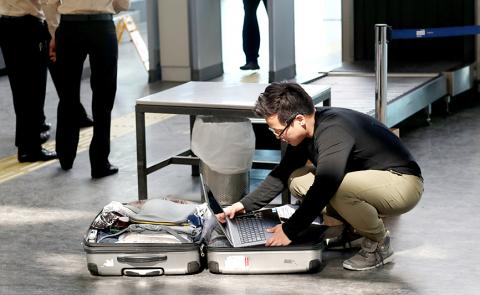Britain on Tuesday joined the US in announcing bans on laptops and tablet computers from the cabin on flights from several Middle East and North African nations.
Canadian and French officials are considering whether to impose similar measures, but Germany, Australia and New Zealand said they are not mulling a ban.
The US ban applies to flights from 10 international airports in eight countries: Turkey, Egypt, the United Arab Emirates, Qatar, Saudi Arabia, Kuwait, Morocco and Jordan.

Photo: EPA
The British ban affects all airports in six countries: Egypt, Jordan, Lebanon, Saudi Arabia, Tunisia and Turkey.
Britain said it would be banning “phones, laptops or tablets larger than a normal-sized mobile or smartphone” from direct inbound flights from the countries named.
It specified that the ban would apply to devices bigger than 16cm in length, 9.3cm wide and 1.5cm thick — smaller than some e-readers like Kindles.
The US said its ban applied to all electronic devices larger than an average-sized mobile phone, including game consoles.
Since US airlines do not have direct flights from the airports affected, its ban affects nine non-US airlines: EgyptAir, Emirates and Etihad Airways, Kuwait Airways, Royal Air Maroc, Royal Jordanian, Qatar Airways, Saudi Airlines and Turkish Airlines.
The British ban affects six British airlines, including charters — British Airways, EasyJet, Jet2.com, Monarch, Thomas Cook and Thomson.
It also affects eight foreign carriers, including Egyptair, Royal Jordanian, Tunis Air and Turkish Airlines.
Airlines in the US have been given 96 hours, from 3am on Tuesday, to inform travelers. Officials were not able to say when the order would end.
The British ban should come into effect “in the coming days,” a Downing Street spokesman told the domestic Press Association news agency yesterday.
Officials in the UK and the US would not give any details on what exactly prompted the bans.
However, the US Department of Homeland Security said extremists were seeking “innovative methods” to attack jets.
It cited an incident in Somalia in February last year in which the al-Shabaab group said it had managed to place a bomb in a plane leaving Mogadishu for Djibouti.
The device exploded shortly after takeoff, ripping a hole in the plane’s side, but killed only the suspected bomber before the aircraft landed safely.
US authorities also cited the downing of a Russian airliner in Egypt in 2015, as well as attacks at airports in Brussels and Istanbul.
A government source in London only said Britain was “privy to the same intelligence” as the US.
“We face a constantly evolving threat from terrorism and must respond accordingly,” British Secretary of State for Transport Minister Chris Grayling said.
CNN quoted a US official as saying the ban was believed to be related to a threat posed by al-Qaeda in the Arabian Peninsula.

FREEDOM OF NAVIGATION: The UK would continue to reinforce ties with Taiwan ‘in a wide range of areas’ as a part of a ‘strong unofficial relationship,’ a paper said The UK plans to conduct more freedom of navigation operations in the Taiwan Strait and the South China Sea, British Secretary of State for Foreign, Commonwealth and Development Affairs David Lammy told the British House of Commons on Tuesday. British Member of Parliament Desmond Swayne said that the Royal Navy’s HMS Spey had passed through the Taiwan Strait “in pursuit of vital international freedom of navigation in the South China Sea.” Swayne asked Lammy whether he agreed that it was “proper and lawful” to do so, and if the UK would continue to carry out similar operations. Lammy replied “yes” to both questions. The

‘OF COURSE A COUNTRY’: The president outlined that Taiwan has all the necessary features of a nation, including citizens, land, government and sovereignty President William Lai (賴清德) discussed the meaning of “nation” during a speech in New Taipei City last night, emphasizing that Taiwan is a country as he condemned China’s misinterpretation of UN Resolution 2758. The speech was the first in a series of 10 that Lai is scheduled to give across Taiwan. It is the responsibility of Taiwanese citizens to stand united to defend their national sovereignty, democracy, liberty, way of life and the future of the next generation, Lai said. This is the most important legacy the people of this era could pass on to future generations, he said. Lai went on to discuss

AMENDMENT: Climate change is expected to increase the frequency of high-temperature days, affecting economic productivity and public health, experts said The Central Weather Administration (CWA) is considering amending the Meteorological Act (氣象法) to classify “high temperatures” as “hazardous weather,” providing a legal basis for work or school closures due to extreme heat. CWA Administrator Lu Kuo-chen (呂國臣) yesterday said the agency plans to submit the proposed amendments to the Executive Yuan for review in the fourth quarter this year. The CWA has been monitoring high-temperature trends for an extended period, and the agency contributes scientific data to the recently established High Temperature Response Alliance led by the Ministry of Environment, Lu said. The data include temperature, humidity, radiation intensity and ambient wind,

SECOND SPEECH: All political parties should work together to defend democracy, protect Taiwan and resist the CCP, despite their differences, the president said President William Lai (賴清德) yesterday discussed how pro-Taiwan and pro-Republic of China (ROC) groups can agree to maintain solidarity on the issue of protecting Taiwan and resisting the Chinese Communist Party (CCP). The talk, delivered last night at Taoyuan’s Hakka Youth Association, was the second in a series of 10 that Lai is scheduled to give across Taiwan. Citing Taiwanese democracy pioneer Chiang Wei-shui’s (蔣渭水) slogan that solidarity brings strength, Lai said it was a call for political parties to find consensus amid disagreements on behalf of bettering the nation. All political parties should work together to defend democracy, protect Taiwan and resist